Trending Now
We have updated our Privacy Policy and Terms of Use for Eurasia Group and its affiliates, including GZERO Media, to clarify the types of data we collect, how we collect it, how we use data and with whom we share data. By using our website you consent to our Terms and Conditions and Privacy Policy, including the transfer of your personal data to the United States from your country of residence, and our use of cookies described in our Cookie Policy.
{{ subpage.title }}
10 memorable quotes on GZERO World with Ian Bremmer in 2024
On our award-winning weekly global affairs show, GZERO World, Ian Bremmer explains the key global stories of the moment and sits down for in-depth conversations with the newsmakers and thought leaders shaping our world. In no particular order, here’s a look back at the 10 most quotable moments from this year’s episodes.
Adam Grant on how AI is changing the world of work
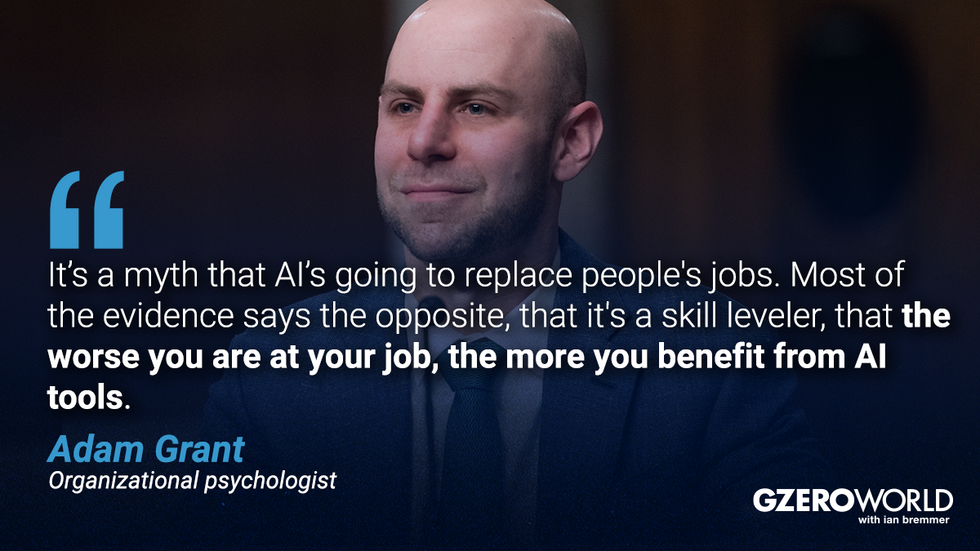
Aired on February 2, 2024
The AI revolution is coming… fast. But what does that mean for your job? Watch Ian Bremmer’s conversation with organizational psychologist Adam Grant.Yuval Noah Harari explains why the world isn't fair (but could be)
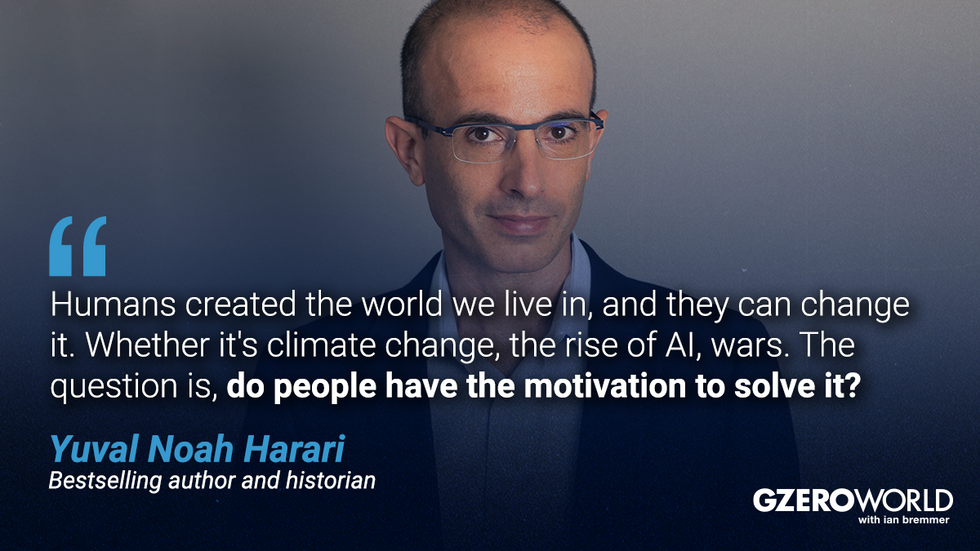
Aired on March 8, 2024
In a conversation filmed live at the historic 92nd Street Y in NYC, Yuval Noah Harari delves into the foundational role of storytelling in human civilization, the existential challenges posed by artificial intelligence, the geopolitical implications of the Ukraine war, and the most pressing questions of the Israeli-Palestinian conflict. Watch the full episode.Thomas L. Friedman on How the Israel-Gaza war could end - if Netanyahu wants it to
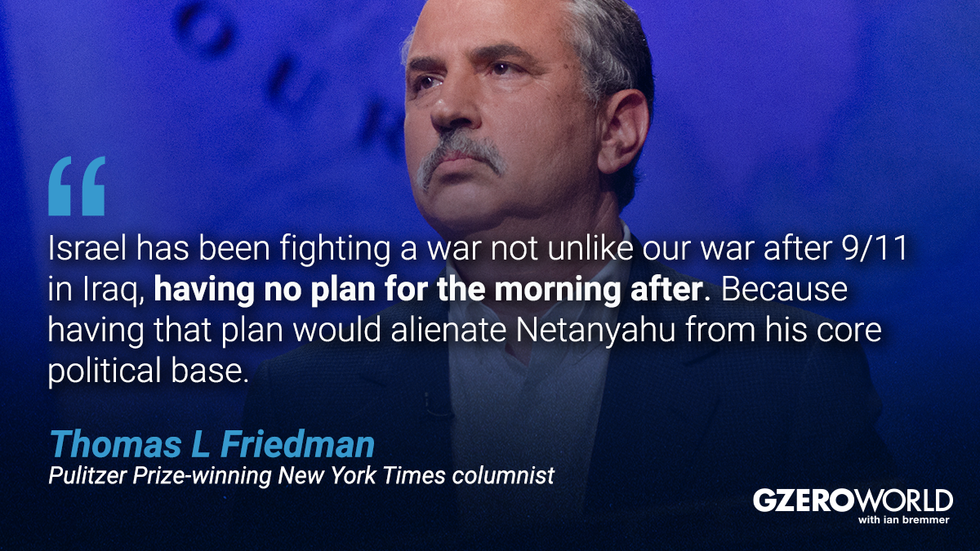
Aired on April 5, 2024
Pulitzer-prize-winning author and New York Times columnist Thomas L. Friedman games out a possible resolution to the war in Gaza and explains why both Israeli Prime Minister Netanyahu and Hamas are obstacles to peace. Watch the full episode.
Emily Bazelon on the major Supreme Court decisions of June 2024
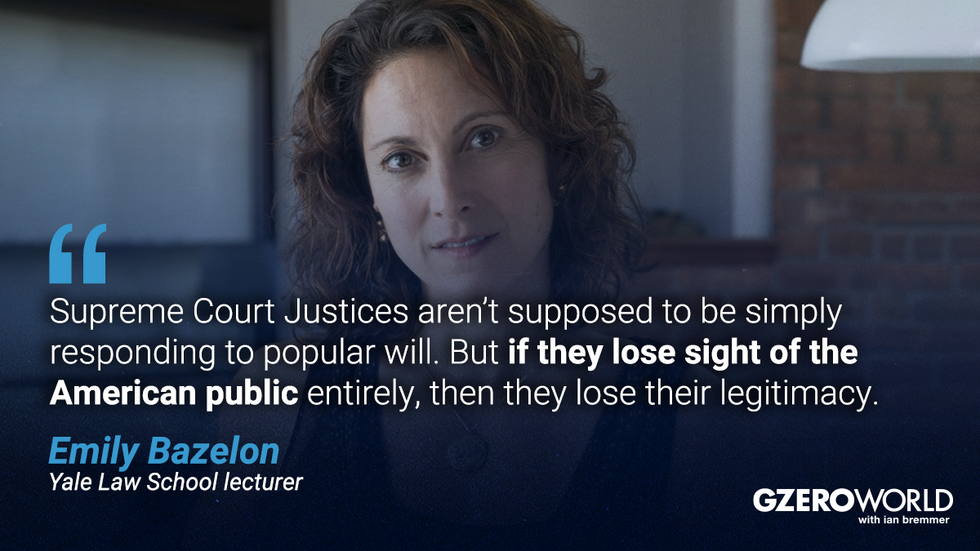
Aired on May 3, 2024
Yale legal scholar and New York Times Magazine staff writer Emily Bazelon unpacks some of the biggest cases that were on the docket this year and how the rulings will impact Americans. Watch the full episode.
Justice & peace in Gaza: The UN Palestinian ambassador's perspective with Riyad Mansour
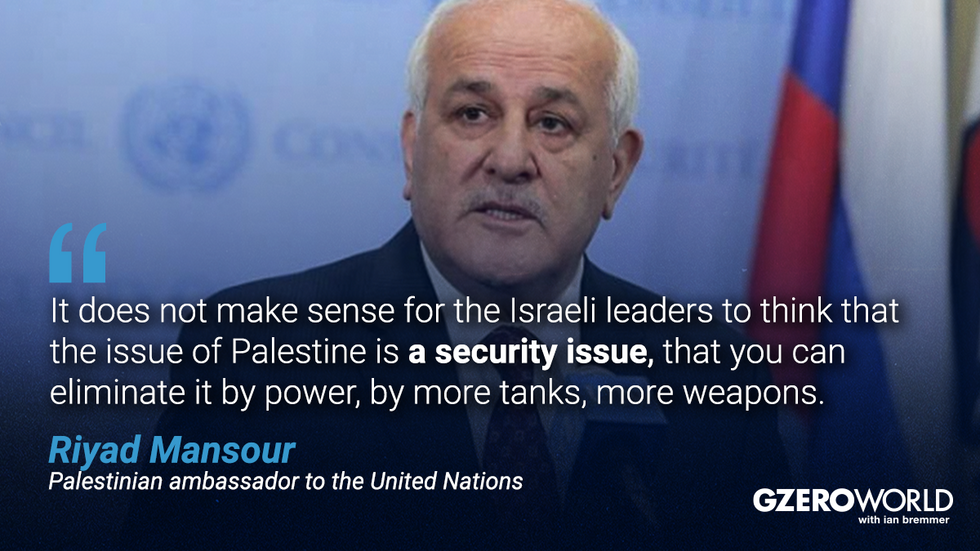
Aired on July 5, 2024
Ian Bremmer sits down with Palestinian Ambassador to the United Nations Riyad Mansour for a candid interview about his role in the UN, the war in Gaza, and how it might end. Watch the full episode.
An exclusive interview with Argentina's radical new president, Javier Milei
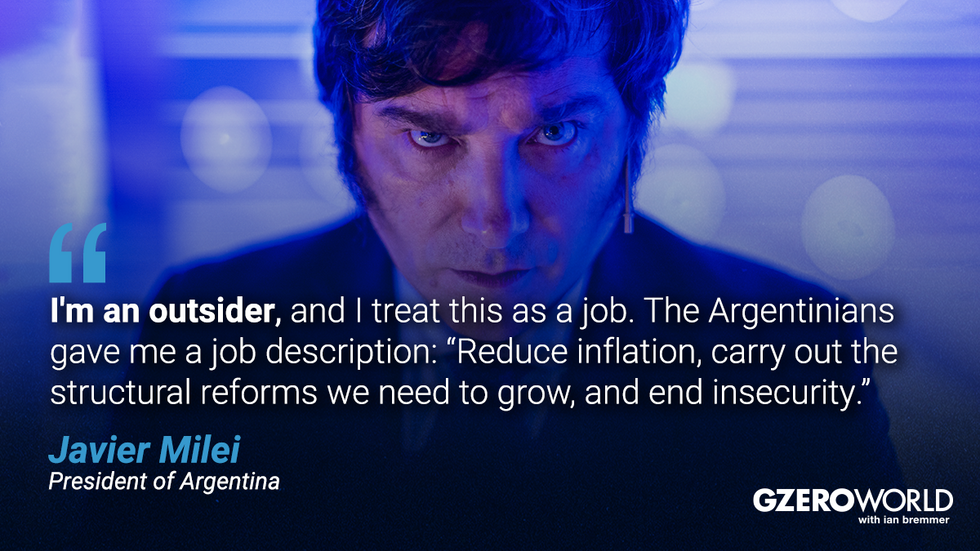
Aired on August 2, 2024
Argentine President Javier Milei defends his radical approach to saving Argentina’s struggling economy, his commitment to aligning with liberal democracies, and his pragmatic stance on international trade and alliances. Watch the full interview.
Why António Guterres believes the UN should lead on AI
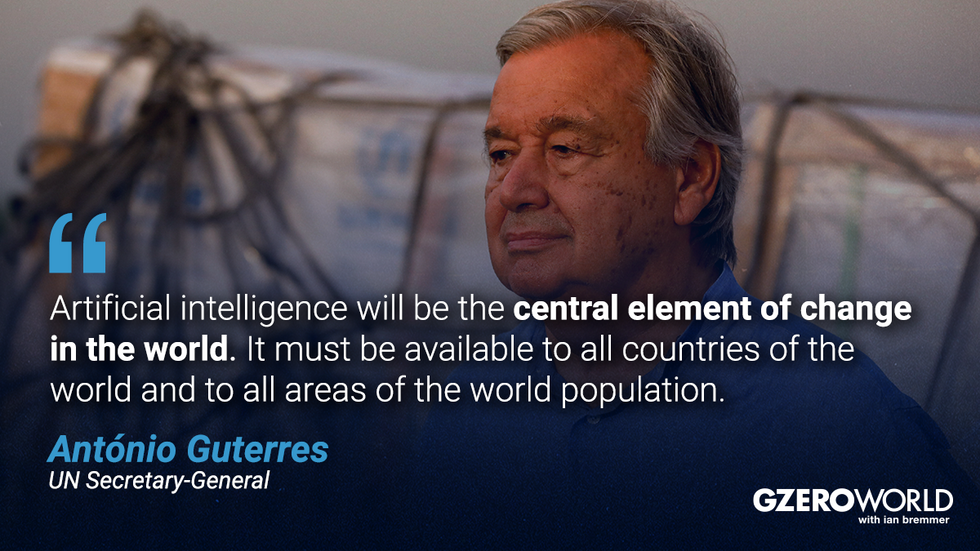
Aired on September 20, 2024
In an exclusive interview for GZERO World, United Nations Secretary-General António Guterres sat with Ian Bremmer on the sidelines of the UN General Assembly to discuss his vision for the future of the UN during his last term in office. Watch the full interview.
Iran's next move: Interview with VP Javad Zarif
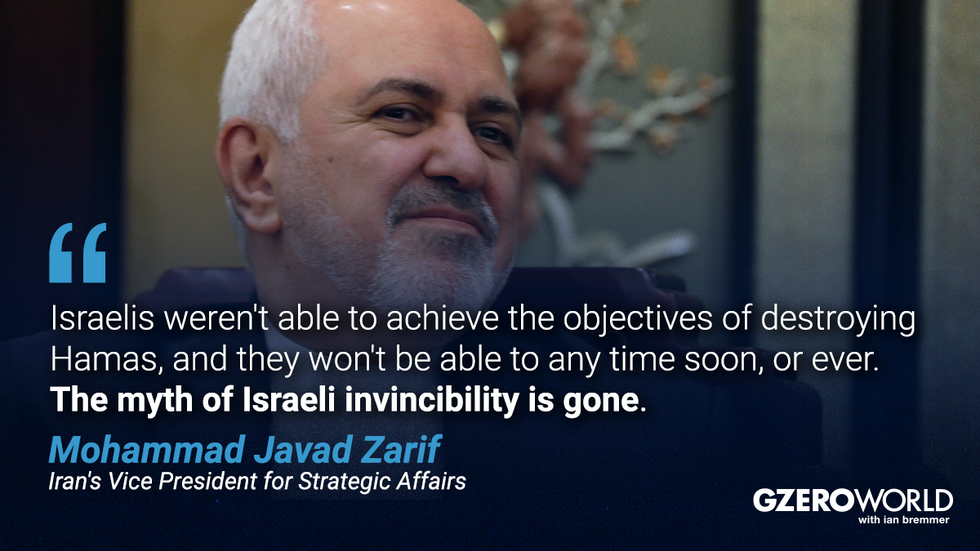
Aired on October 4, 2024
Ian Bremmer sits down with Iran's new Vice President for Strategic Affairs Mohammad Javad Zarif just days before the assassination of Hezbollah leader Hassan Nasrallah to discuss the escalating conflict in the Middle East and where Iran stands. Watch the full episode.
Roberta Metsola on whether Europe can become a global superpower
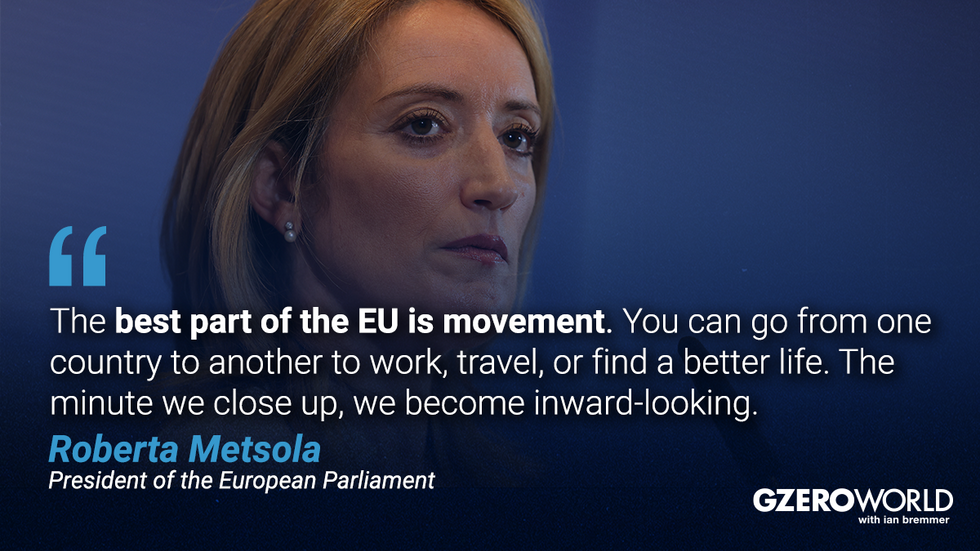
Aired on October 20, 2024
European Parliament President Roberta Metsola discusses Europe’s future amid an ongoing migrant crisis, the war in Ukraine, and an economic slowdown. Can the bloc’s 27 member states stay united? Watch the full episode.
Oren Cass on the case for Trump's tariffs
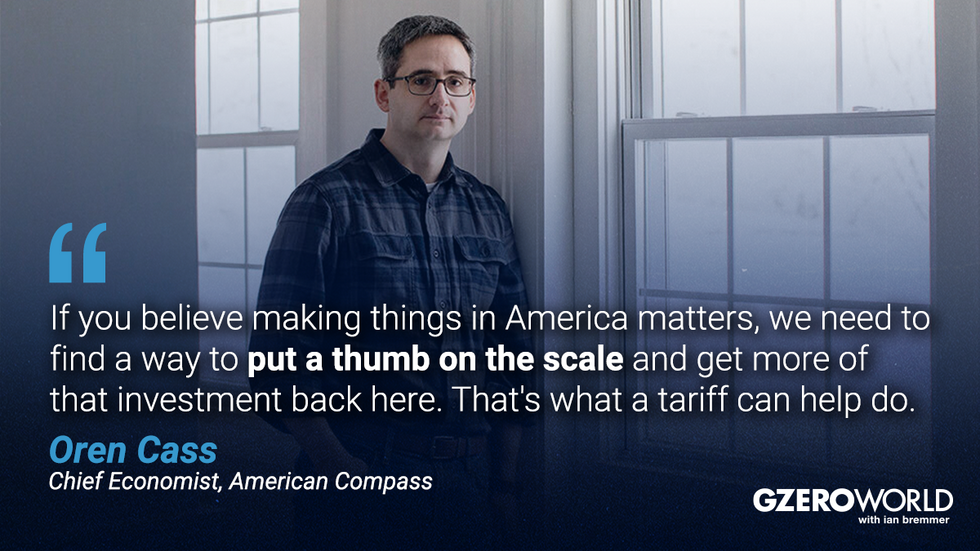
Aired on December 6, 2024
Trump has vowed to raise tariffs, slash business regulation, and deport millions of undocumented immigrants, policies he says will put Americans first. Oren Cass outlines what that will mean practically for workers and consumers. Watch the full episode.
Don’t miss an episode in 2025!
GZERO World airs nationwide on US public television (check local listings), and new digital episodes of GZERO World are released every Monday on YouTube.
Guterres: Now is the time for UN Security Council reform
For years, meaningful reform of the UN Security Council was considered an impossible pipe dream that could never happen. But with so many ongoing global crises, now is the time to reform institutions to meet the political and economic realities of today's world. On GZERO World with Ian Bremmer, UN Secretary-General António Guterres says he’s most concerned with a lack of accountability, growing impunity, and countries fragmenting further into coalitions and blocs, which is at odds with everything the UN stands for. The world has changed dramatically since the UN was formed in 1945, and it's time to reform outdated, unfair institutions, like the Security Council, that concentrate power in the hands of a few wealthy countries and don't reflect current reality. Guterres says giving an African country a permanent seat on the Council “must be done,” but admits extending veto power to an African member will be a major challenge.
“The African situation, it is in historic injustice,” Guterres explains, “For the first time, the five permanent members recognize that they are ready to accept at least an African permanent member in the Security Council.”
GZERO World with Ian Bremmer, the award-winning weekly global affairs series, airs nationwide on US public television stations (check local listings).
New digital episodes of GZERO World are released every Monday on YouTube. Don't miss an episode: subscribe to GZERO's YouTube channel and turn on notifications (🔔).
- Podcast: UN Ambassador Linda Thomas-Greenfield on Russia, human rights, & the Security Council presidency ›
- Ian Explains: Why Russia has a permanent seat on the UN Security Council ›
- 4 things to know about the Munich Security Conference ›
- Zelensky takes aim at the UN Security Council - GZERO Media ›
- UN Security Council: Liberia’s top diplomat joins calls for Africa’s representation - GZERO Media ›
Why António Guterres believes the UN should lead on AI: Exclusive interview
United Nations Secretary-General António Guterres warned at last year’s General Assembly, “It’s reform or rupture.” But reforming the UN to meet the economic and political realities of today’s world, one dividing it further into coalitions and blocs, is no easy task. In an exclusive interview for GZERO World, Guterres sat with Ian Bremmer on the sidelines of the UN General Assembly to discuss his vision for the future of the UN during his last term in office. Between ongoing wars in Ukraine and Gaza, the climate crisis threatening the lives of millions, a broken Security Council, and the growing power (and existential risk) of AI, there’s a lot to discuss. Can the UN adapt for the future? Can it show the world multilateralism still has a place amid all the fragmentation? Guterres believes change is always possible as long as there is will and determination.
“The United Nations has one important characteristic: Its legitimacy,” Guterres says, “It's a platform where everybody can be together.”
GZERO World with Ian Bremmer, the award-winning weekly global affairs series, airs nationwide on US public television stations (check local listings).
New digital episodes of GZERO World are released every Monday on YouTube. Don't miss an episode: subscribe to GZERO's YouTube channel and turn on notifications (🔔).
- Can the UN get the world to agree on AI safety? ›
- UN Secretary-General António Guterres: why we still need the United Nations ›
- Podcast: UN Secretary-General António Guterres explains why peace in Ukraine is his top priority ›
- Peace in Ukraine is world's priority, says UN chief António Guterres ›
- UN’s first global framework for AI governance - GZERO Media ›
UN Secretary-General António Guterres on AI, Security Council reform, and global conflicts
UN Secretary-General António Guterres joins Ian Bremmer on the GZERO World Podcast for an exclusive conversation from the sidelines of the General Assembly at a critical moment for the world and the UN itself. Amid so many ongoing crises, is meaningful reform at the world’s largest multilateral institution possible? Between ongoing wars in Ukraine and Gaza, the climate crisis threatening the lives of millions, and a broken Security Council, there’s a lot to discuss. But there are some reasons for optimism. This year could bring the UN into a new era by addressing one of the biggest challenges facing our society: artificial intelligence and the growing digital divide. This year, the UN will hold its first-ever Summit of the Future, where members will vote on a Global Digital Compact, agreeing to shared principles for AI and digital governance. In a wide-ranging conversation, Guterres lays out his vision for the future of the UN and why he believes now is the time to reform our institutions to meet today’s political and economic realities.
Subscribe to the GZERO World Podcast on Apple Podcasts, Spotify, Stitcher, or your preferred podcast platform, to receive new episodes as soon as they're published.
- Can the UN get the world to agree on AI safety? ›
- An interview with UN Secretary-General António Guterres ›
- 2023 UN General Assembly's top objective, according to António Guterres ›
- Peace in Ukraine is world's priority, says UN chief António Guterres ›
- UN’s first global framework for AI governance - GZERO Media ›
- The challenges of peacekeeping amid rising global conflicts - GZERO Media ›
- At the Paris Peace Forum, war and conflicts were topics du jour - GZERO Media ›
Ian Explains: Why is the UN's Summit of the Future so important?
Will the United Nations be able to adapt to address problems of the modern era, like artificial intelligence and the growing digital divide? On Ian Explains, Ian Bremmer looks at the challenges of multilateralism in an increasingly fragmented world.
In the face of crises like Russia’s invasion of Ukraine, the war in Gaza, and a rapidly warming planet, the UN’s goals of peace and security feel like a failure. But this year’s Summit of the Future during the General Assembly could be a turning point for the 78-year-old institution. UN members will vote on a Global Digital Compact to regulate AI, fight misinformation, and connect the whole world to the internet. Bremmer is one of 39 experts on the UN’s High-Level Advisory Body who've been studying the issue of global AI governance for the past year to better understand what that Compact should include. This week, the group released a report called “Governing AI for Humanity” with recommendations for creating a global regulatory framework for AI that is safe, inclusive, and equitable. Instead of a patchwork of regulation that’s happened so far, which has been concentrated in wealthy countries, can the UN lead the global AI conversation?
GZERO World with Ian Bremmer, the award-winning weekly global affairs series, airs nationwide on US public television stations (check local listings).
New digital episodes of GZERO World are released every Monday on YouTube. Don''t miss an episode: subscribe to GZERO's YouTube channel and turn on notifications (🔔).
Breaking: The UN unveils plan for AI
Overnight, and after months of deliberation, a United Nations advisory body studying artificial intelligence released its final report. Aptly called “Governing AI for Humanity,” it is a set of findings and policy recommendations for the international organization and an update since the group’s interim report in December 2023.
“As experts, we remain optimistic about the future of AI and its potential for good. That optimism depends, however, on realism about the risks and the inadequacy of structures and incentives currently in place,” the report’s authors wrote. “The technology is too important, and the stakes are too high, to rely only on market forces and a fragmented patchwork of national and multilateral action.”
Before we dive in, a quick humblebrag and editorial disclosure: Ian Bremmer, founder and president of both Eurasia Group and GZERO Media, served as a rapporteur for the UN High-Level Advisory Body on Artificial Intelligence, the group in charge of the report.
The HLAB-AI report asks the UN to begin working on a “globally inclusive” system for AI governance, calls on governments and stakeholders to develop AI in a way that protects human rights, and it makes seven recommendations. Let’s dive in to each:
- An international scientific panel on AI: A new group of volunteer experts would issue an annual report on AI risks and opportunities. They’d also contribute regular research on how AI could help achieve the UN’s Sustainable Development Goals, or SDGs.
- Policy dialogue on AI governance: A twice-yearly policy dialogue with governments and stakeholders on best practices for AI governance. It’d have an emphasis on “international interoperability” of AI governance.
- AI standards exchange: This effort would develop common definitions and standards for evaluating AI systems. It’d create a new process for identifying gaps in these definitions and how to write them, as well.
- Capacity development network: A network of new development centers that will provide researchers and social entrepreneurs with expertise, training data, and computing. It’d also develop online educational resources for university students and a fellowship program for individuals to spend time in academic institutions and tech companies.
- Global fund for AI: A new fund that would collect donations from public and private groups and disburse money to “put a floor under the AI divide,” focused on countries with fewer resources to fund AI.
- Global AI data framework: An initiative to set common standards and best practices governing AI training data and its provenance. It’d hold a repository of data sets and models to help achieve the SDGs.
- AI office within the Secretariat: This new office would see through the proposals in this report and advise the Secretary-General on all matters relating to AI.
The report’s authors conclude the report by remarking that if the UN is able to chart the right path forward, “we can look back in five years at an AI governance landscape that is inclusive and empowering for individuals, communities, and States everywhere.”
To learn more, Ian will host a UN panel conversation on Saturday, Sept. 21, which you can watch live here. And if you miss it, we’ll have a recap in our GZERO AI newsletter on Tuesday. You can also check out the full report here.
Can the UN get the world to agree on AI safety?
Artificial intelligence has the power to transform our world, but it’s also an existential threat. There's been a patchwork of efforts to regulate AI, but they’ve been concentrated in wealthy countries, while those in the Global South, who stand to benefit most from AI’s potential, have been left out. Can the United Nations come together at this year’s General Assembly to agree on standards for a safe, equitable, and inclusive AI future?
Tomorrow, the UN’s High Level Advisory Body on AI will release a report called “Governing AI for Humanity,” with recommendations for global AI governance that will be a roadmap for safeguarding our digital future and making sure AI will truly benefit everyone in the world. Ian Bremmer is one of the 39 experts on the AI Advisory Body, and he sat down with UN Secretary-General António Guterres for an exclusive GZERO World interview on the sidelines of the General Assembly to discuss the report and why Guterres believes the UN is the only organization capable of creating a truly global, inclusive framework for AI.
“The United Nations has one important characteristic: its legitimacy. It's a platform where everybody can be together,” Guterres says, “Others have the power, others have the money, but not the legitimacy or the convening power the UN has.”
The exclusive conversation begins airing nationally on GZERO World with Ian Bremmer on public television this Friday, Sept. 20. Everything you need to know about Advisory Body’s final report will be dissected and analyzed in the GZERO Daily, landing in inboxes tomorrow (Sept. 19) at 7 am. Sign up here.
GZERO World with Ian Bremmer, the award-winning weekly global affairs series, airs nationwide on US public television stations (check local listings).
New digital episodes of GZERO World are released every Monday on YouTube. Don''t miss an episode: subscribe to GZERO's YouTube channel and turn on notifications (🔔).
- Peace in Ukraine is world's priority, says UN chief António Guterres ›
- The White House sees AI clash with climate goals ›
- Yuval Noah Harari: AI is a “social weapon of mass destruction” to humanity ›
- How is AI shaping culture in the art world? ›
- Ian Explains: Why is the UN's Summit of the Future so important? - GZERO Media ›
- Can we use AI to secure the world's digital future? - GZERO Media ›
Will Israel's ban on UN staff impact peace efforts?
Ian Bremmer shares his insights on global politics this week on World In :60.
Is Israel's UN ban a blow to peace efforts?
If it was permanent, I'd say yes as it is. I think we won't be talking about it in a few days. Look, obviously, on the back of these horrific terrorist attacks, everyone in Israel is on edge and more willing to lash out when they hear anything that sounds not 100% aligned with the message they want to hear. I'm empathetic to that, and I expect they're going to back away, especially because the Secretary-General has been consistent in talking about how he has condemned Hamas terrorist attacks. You know, anyone can pick a sentence and cherry-pick it for their purposes. That's what's happened here. I think it's unfortunate. The Global South will certainly align more with the Secretary-General, as they always do. But Antonio then doubled down and clarified his statement on Hamas all the way through. I think this will not be a big deal.
Will Qatar's diplomacy efforts secure the release of Gaza hostages?
Meaning more Gaza hostages. We've got four out so far. I certainly think a lot more can be released if there is further delay for Israel on the ground assault. And, you know, frankly, I think that there's very good reason for the Israelis to continue to hold off. I mean, the fact of the matter is, you will get more citizens, not military people that have been captured, and there are a bunch of those, too. But I think, you know, women, children, infirm, the aged, the willingness of Hamas to let them go, buy themselves time, get more international support as they do it, less condemnation and work with the Qataris is probably pretty high. So I do think that that's going to happen. But I'd be very surprised if the Israelis are willing to wait for like a month before the invasion. It does feel to me increasingly soon.
How will Erdoğan's stance on Hamas impact Turkey's standing with the Western world?
Well, I mean, it's not new that Erdoğan has had warm relations with Hamas, supported Hamas, and certainly has not considered them a terrorist organization as the United States does. He also has recently, after the terrorist attacks, refused to condemn them. That is a harder-line policy than we see even from the Kingdom of Saudi Arabia right now. And keep in mind, Turkey is a NATO ally. On the other hand, they're now letting the Sweden vote go through the parliament. So, I mean, the fact is that Turkey has always been a NATO's ally with challenges and they're never 100% aligned with the United States and most of Europe on most things. And this continues to be the case. But let's be clear that unlike the Russian invasion of Ukraine, where the entire West was aligned, on the Israeli response to the Hamas terrorist attacks, the West is not fully aligned. And certainly most of the world opposes Israel's military bombings. The extent of the bombings as well as the likely ground invasion. So in that regard, I think there's less to be seen here with Turkey's position.
That's it for me, and I'll talk to you all real soon.




